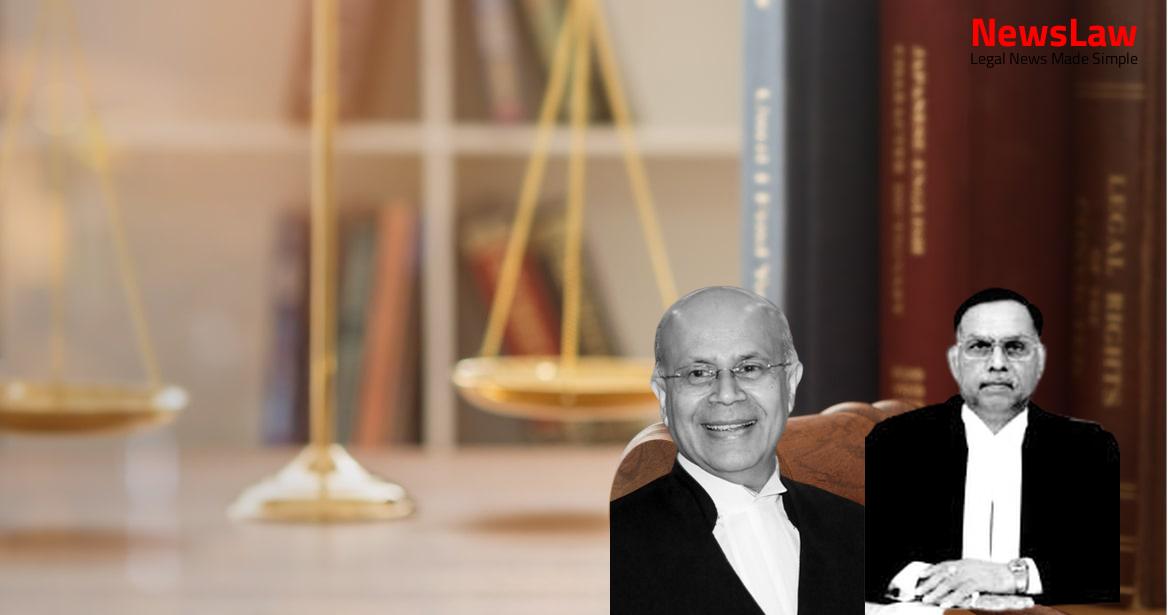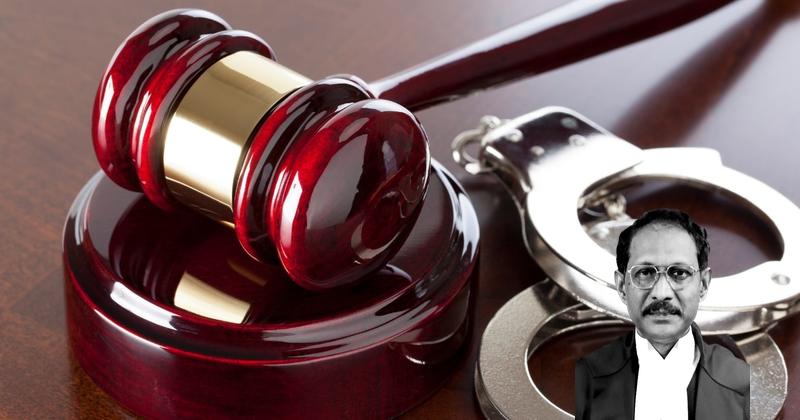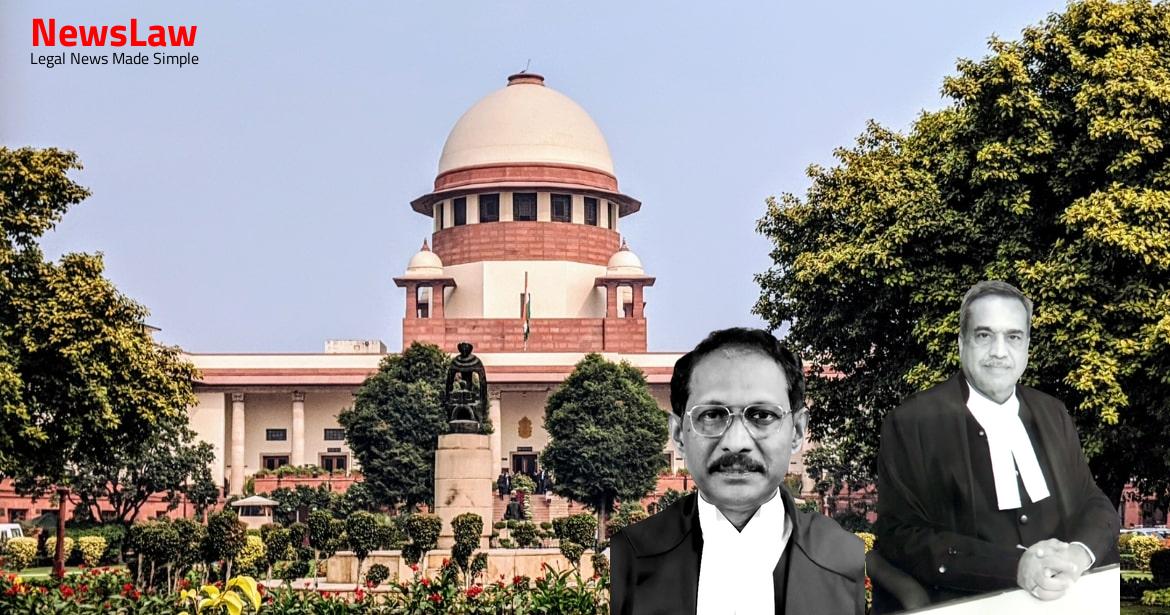In a significant legal case, the Supreme Court has delivered a judgment on the dismissal order and voluntary retirement in the matter involving Sri Rathin Ghosh and WBSBCL. The Court’s decision holds major implications for similar cases in the future. Read on to understand the details and the reasoning behind the ruling.
Facts
- The appellant, with 22 years of unblemished service, was suspended by the Company on 29.04.2008.
- Disciplinary proceedings were initiated against the appellant based on allegations of gross misconduct.
- The appellant attended a presentation in New Delhi on 26.03.2008 organized by IEEMA.
- Sample meters were tested on 13.03.2008, with only four bidders found technically qualified.
- Appellant’s resignation letter proposed as voluntary retirement, but was not accepted by the Company.
- The second show-cause notice issued to the appellant proposed dismissal from service.
- Appellant submitted resignation on 13.05.2008, which was not accepted due to ongoing disciplinary proceedings.
- The Company suspended appellant on 29.04.2008 and initiated disciplinary actions.
- Appellant’s suspension was deemed an act of vengeance according to his resignation letter.
- A detailed reply to show-cause was submitted by the appellant on 20.06.2008.
- The charges against the delinquent employee were two-fold.
- He gave a presentation in a seminar on 17.04.2008 in New Delhi hosted by IEEMA without permission from his higher authority.
- He availed the hospitality of SML for his air fare from Kolkata to New Delhi and return journey, which placed him under a pecuniary obligation to SML.
- The Division Bench of the High Court set aside the judgment of the Single Judge.
Also Read: Dispensation with Personal Appearance in Criminal Case: Landmark Judgement by Supreme Court of India
Arguments
- The appellant had informed his immediate superior about his absence for a presentation in New Delhi and his casual leave was also allowed, hence no misconduct was committed.
- The tender notice in question was cancelled, and the appellant was not directly involved in the decision-making process regarding the technical report submitted.
- There were no allegations of the appellant receiving any benefits or causing any loss to the company in relation to M/s. Secure Meters.
- The disciplinary authority did not consider the appellant’s representation against the inquiry officer’s findings, leading to a disproportionate punishment of dismissal.
- The appellant had a service of 22 years with an unblemished record, making the charges against him questionable.
- No payment for the air tickets obtained from M/s. Secure Meters was made by the company, and there was no evidence of the appellant receiving any pecuniary benefits.
- The punishment of dismissal was deemed disproportionate and should be set aside.
- The company has lost confidence in the appellant due to proven charges in the inquiry proceedings.
- The appellant, as an officer, had official dealings with M/s. Secure Meters and received benefits like air tickets and hospitality, which is considered misconduct under Service Rules and Service Regulations.
- The learned Single Judge was criticized for interfering with the punishment imposed after the charges were proven.
- The disciplinary action of permanent withholding of pension for a lifetime and forfeiture of entire gratuity was deemed to be without jurisdiction as per the Service Regulations followed by WBSBCL.
Also Read: Case of Unnatural Death in Matrimonial Home: Supreme Court Judgment
Analysis
- Appellant had informed his superior in advance about attending a presentation in New Delhi.
- The punishment imposed must be proportionate to the charge and gravity of misconduct.
- The punishment of withholding pension and forfeiture of gratuity was not justified as the appellant was not a pensioner.
- The disciplinary authority has the exclusive power to impose appropriate punishment.
- The disciplinary authority committed a jurisdictional error in imposing extreme punishments of dismissal, withholding of pension, and forfeiture of gratuity.
- The charges against the appellant did not warrant the extreme punishment of dismissal from service.
- The inquiry proceedings lacked consideration of relevant aspects and seemed premeditated.
- The appellant did not derive any benefit from the company in the charges that were held to be proved.
- The penalty imposed should not shock the conscience of the court.
- The High Court/Tribunal possesses the power of judicial review in disciplinary proceedings.
- Disciplinary authorities have the discretion to impose appropriate punishment based on the gravity of the misconduct.
- Judicial review in disciplinary proceedings is limited to ensuring procedural fairness.
- Disciplinary authorities are fact-finding bodies with the exclusive power to evaluate evidence.
- Maintaining discipline is a key consideration in disciplinary proceedings.
- Parameters for judicial review in disciplinary cases were laid down in B.C. Chaturvedi vs Union of India case.
- The Board has the right to withhold pension in certain cases as mentioned in Regulation 11A(2).
- The pre-condition for withholding pension is if the pensioner is found guilty of grave misconduct or negligence during their service.
- The Board can withhold or withdraw pension if the pensioner is found guilty of grave misconduct or negligence in a departmental or judicial proceeding during their service.
- Departmental proceedings initiated before or after retirement will be continued and concluded by the same authority.
- Judicial proceedings not initiated during service require the sanction of the Board and have a time limit of four years.
- Regulation 61 deals with misconduct while Regulation 62 specifies punishments.
- Regulation 6(i) defines ‘pension’ which includes gratuity.
- Regulation 11A allows withholding of pension to meet liabilities incurred to the Board, with a provision for release in rare cases during criminal proceedings if certain conditions are met.
- The Division Bench’s judgment was not sustained by the court.
- The learned Single Judge’s decision to set aside the dismissal order was upheld.
- The court agreed with the Single Judge’s ruling.
Also Read: The Jodha Ram vs. Kaushaliya Dispute: Supreme Court Judgement Summary
Decision
- The appellant submitted his resignation on 13.05.2008, which was not accepted by the respondent.
- The Court proposed treating the resignation letter as voluntary retirement, entitling the appellant to all retirement benefits as of that date.
- The appeal is allowed, setting aside the dismissal order and directing the resignation letter to be treated as voluntary retirement on 13.05.2008.
- The respondents are directed to compute and pay all benefits accruing to the appellant within two months.
- In case of payment delay, interest at 6% per annum will apply.
- Forfeiture of entire gratuity is not upheld, and suspension of Sri Rathin Ghosh, S.E. (E) is confirmed.
Case Title: RATHIN GHOSH Vs. WEST BENGAL STATE ELECTRICITY DISTRIBUTION COMPANY LTD.
Case Number: C.A. No.-005633-005633 / 2019



